Booklet 4: early adolescence - Disability Services Commission
Booklet 4: early adolescence - Disability Services Commission
Booklet 4: early adolescence - Disability Services Commission
Create successful ePaper yourself
Turn your PDF publications into a flip-book with our unique Google optimized e-Paper software.
<strong>Disability</strong> and magazines<br />
In this experience, students analyse the<br />
portrayal of disability in magazines specifically<br />
marketed to people with disabilities.<br />
Look at the content and layout of a magazine<br />
specifically targeting people with disabilities,<br />
eg<br />
• CP Australia www.cpaustralia.com.au/<br />
• Ability www.abilitymagazine.com/<br />
• NM New Mobility<br />
www.newmobility.com/index.cfm with<br />
• Link magazine<br />
www.disability.com.au/link_online/<br />
• Exceptional Parent www.eparent.com/<br />
• Paralinks – The electronic magazine for<br />
people with spinal cord injury<br />
www.paralinks.net<br />
How is disability portrayed?<br />
• Does the magazine show people’s abilities<br />
as well as disabilities?<br />
• Does it use people-first language?<br />
• Is disability portrayed as a barrier or<br />
challenge?<br />
• Does disability appear in the articles<br />
unnecessarily?<br />
<strong>Disability</strong> and movies<br />
In this experience, students examine the<br />
portrayal of disability in movies.<br />
View one or more movie about disability.<br />
www.disabilityfilms.co.uk has a very extensive<br />
listing of movies including synopses of each of<br />
them. http://disabilityfilms.tripod.com/index.html<br />
is another source of information. 10<br />
Prepare a poster advertising the movie. Include<br />
in your poster words or images that convey:<br />
• the intended audience for the movie;<br />
• the main message of the movie; and<br />
• the overall portrayal of disability.<br />
Listening and speaking<br />
In this experience, students speak with people<br />
with disabilities about the portrayal of disability.<br />
Consider inviting a guest speaker to the class<br />
to talk of their experience. (See guest speaker<br />
database online at www.countusin.com.au;<br />
Teacher Information booklet for appropriate<br />
language and meeting a person with a<br />
disability and Appendix for Meeting People<br />
with Disabilities and Offering Assistance.<br />
Ensure that the questions are appropriate and<br />
respectful of privacy.)<br />
How do people with disabilities feel about the<br />
ways in which disability is portrayed? Compile<br />
a set of interview questions that enables you to<br />
explore the perspectives, ideas and opinions<br />
of someone with direct experience of disability.<br />
Conduct your interview.<br />
Find a way to present these perspectives in an<br />
oral report to your class.<br />
Prepare a written report of your interview. Explain:<br />
• what you did that helped the interviewee to<br />
feel comfortable;<br />
• what you did to find out what they thought;<br />
• what you did to clarify what they said;<br />
• the things you did that helped the interview<br />
to be successful and how you know it was;<br />
and<br />
• the things you would do differently in a<br />
future interview and why.<br />
Writing<br />
In this experience, students explore personal<br />
perspectives of a hypothetical disability that<br />
they have acquired through a motor vehicle<br />
accident, illness or sporting accident etc.<br />
Students write diary entries describing their<br />
feelings, actions, implications and the effect of<br />
the disability on their lives.<br />
Teachers may assign or randomly assign an<br />
acquired disability to a student.<br />
The disabilities included in this activity are only<br />
those that the students could acquire at this<br />
age or older ( You may like to use the disability<br />
specific information in the teacher information<br />
booklet for contacts and links):<br />
• spinal cord injury resulting in paraplegia,<br />
eg from a traffic accident;<br />
• spinal cord injury resulting in quadriplegia,<br />
eg from diving into a pool;<br />
• acquired brain injury, eg from a fall in a<br />
sporting activity;<br />
• vision impairment, eg from bungee<br />
jumping;<br />
124<br />
Count Us In! teaching resource package<br />
Portrayals of disability


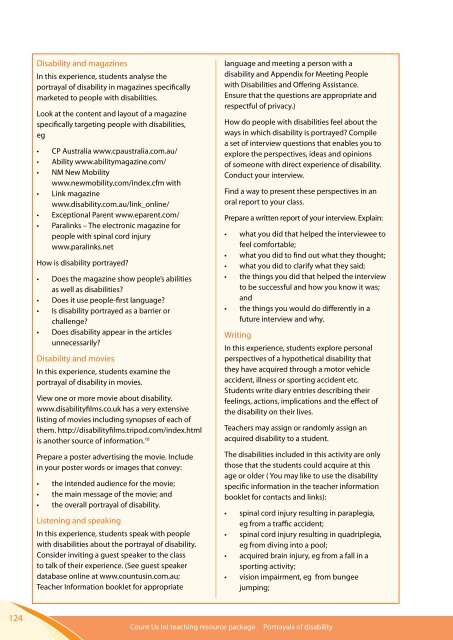
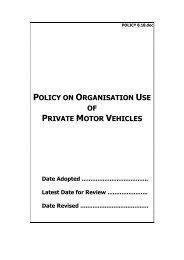
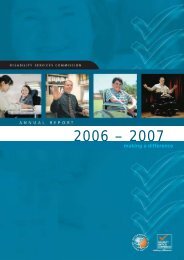

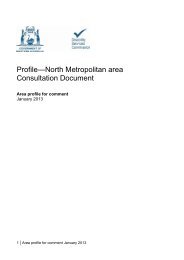
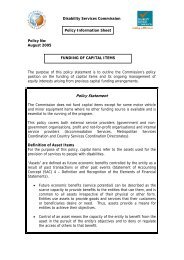
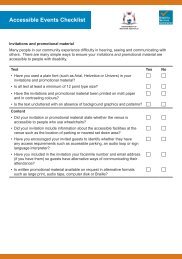
![Heerarka Adeegyada Naafada [PDF 102 kB] - Disability Services ...](https://img.yumpu.com/22096139/1/184x260/heerarka-adeegyada-naafada-pdf-102-kb-disability-services-.jpg?quality=85)
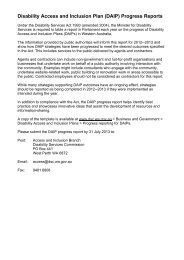
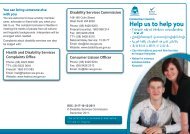
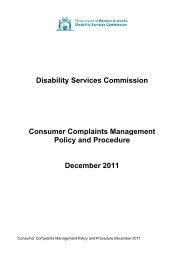
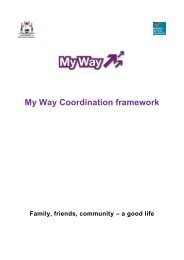
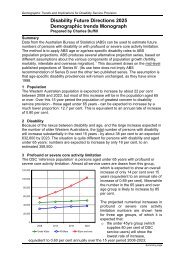
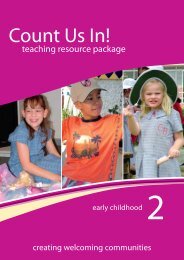
![معايير خدمات الإعاقة [PDF 297 kB] - Disability Services Commission](https://img.yumpu.com/22096120/1/184x260/-pdf-297-kb-disability-services-commission.jpg?quality=85)